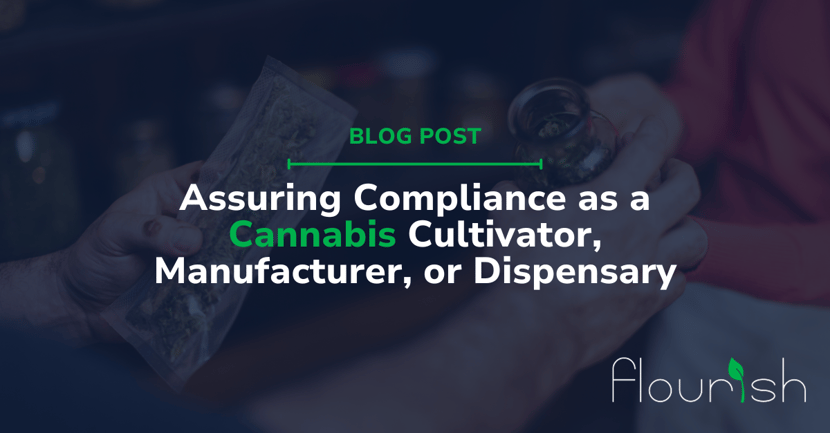
In this blog post, we’ll discuss the three major stages of cannabis production, cultivation, manufacturing, and retail dispensary, and how to ensure both complete and streamlined compliance at every level.
Cultivator Compliance, or Cannabis Farm Compliance
Compliance as a cultivator ensures the safety of your product for consumers and helps maintain the integrity of the industry broadly speaking. To be compliant as a cultivator you must adhere to a variety of state and local guidelines that regulate the various aspects of the growing process. Early on, this means obtaining a grow license, which in some cases will be restricted on the basis of various credentials. In New York state, for example, only cultivators previously licensed to grow hemp are eligible to apply for a cannabis cultivator’s license.
There’s also the element of quality control, which can range from ensuring your product is free from harmful pesticides, heavy metals, and microbial contaminants, to regular testing through accredited labs. To retain compliance over time, proper record keeping is critical, with track and trace systems implemented to account for every plant from seed to sale. This not only prevents illegal diversion but also ensures that the product can be traced back to its source if issues arise. Additionally, cultivators must follow regulations on security protocols, waste disposal, water usage, and environmental impacts to ensure that their operation does not negatively affect the surrounding community or ecosystem.
Cannabis Compliance as a Safety Mechanism
One of the key cases for legalization rests on drug safety. First and foremost, compliance safeguards the health and well-being of consumers. As the cannabis industry continues to evolve, establishing trust through consistently safe and high-quality products is crucial for longevity. It’s also important to be able to prove a consistent and documented record of compliance if you’re seeking private funding, as investor trust often depends, in part, on a proven compliance record.
Cannabis Manufacturing Compliance
As with cultivation, manufacturing compliance starts with securing a manufacturer’s license in your state. Again, as with a cultivator’s license, this may be restricted to certain previously certified groups, as it is in New York state. It may also entail a lengthy application process. Once you’re licensed to manufacture, expect regular inspections, record-keeping, and audits, all of which are typical components of the regulatory framework. These records often include detailed accounts of sourcing, production methods, employee training, and product testing. Alongside these details, rigorous standards for both the quality and safety of the product, including potency testing and contamination testing, fill out the set of mandated requirements. Lastly, labeling requirements that vary state to state and can be painstakingly thorough are a final component of the process. Although it is the final part of the process, without proper labeling adult-use cannabis cannot be legally sold. State guidelines for labeling tend to be detailed and complex, so increasingly streamlined compliance has come to rely on software with labeling capabilities, a service at varying stages of sophistication depending on the cannabis software company. Typically these labels are marked to indicate THS and CBD levels as well as allergens and potential contaminants.
Manufacturer’s compliance is important because it serves to protect consumers who increasingly care about the contents of their products. While weed in the black market era involved some guesswork around dosage, consumers can now expect to know exactly what dose they want and are getting. In an industry that still carries associations with illegal black markets, adherence to regulations helps fortify the legitimacy of adult-use weed. Non-compliance, on the other hand, not only risks hefty penalties, business closures, or legal action but can also tarnish the reputation of the broader industry, hindering its growth and acceptance in mainstream society. In essence, being compliant is both a safeguard for the present and an investment in the industry's future. Manufacturers who want to avoid the detail-driven headache of labeling and more are increasingly investing in software solutions that can streamline the process for them as they allocate energy to other sides of the business.
Cannabis Dispensary Compliance
Dispensary compliance, like manufacturing and cultivation, begins with securing the relevant licensure. Again, these licenses often entail a lengthy application process and may be restricted to certain groups. Dispensary compliance can encompass a wide array of operations, including adhering to strict product tracking and reporting measures, ensuring that cannabis products are tested for safety and potency, adhering to advertising and marketing restrictions, and selling cannabis only to eligible customers in the stipulated quantity and packaging. It’s also important for dispensary operators to keep, increasingly via software, thorough transaction records, as will come into play during tax season.
Ensure Complete Compliance and More with Flourish
To streamline your compliance via a modern software option, consider Flourish, a full service cannabis software company offering easy syncing with required track and trace platforms as well as state of the art technology. To read more about Flourish and what it can do for your cannabis company’s software needs, click here.




